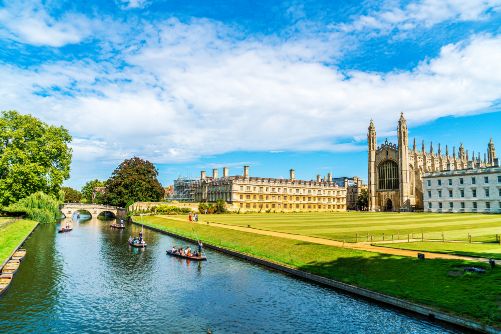Table of Contents
- Cambridge University | An overview
- Answers to the top 14 FAQs about Cambridge University
- 1. Is Cambridge University good?
- 2. Is Cambridge University in London?
- 3. Is the university an expensive one?
- 4. Is Cambridge University an Ivy League school?
- 5. Is the university’s press peer-reviewed?
- 6. Is Cambridge University Press reliable?
- 7. Is the university’s acceptance rate high?
- 8. Are the students allowed to work?
- 9. Are visitors allowed at the university?
- 10. Is Cambridge University a member of the Russell Group?
- 11. Is Cambridge a public or private university?
- 12. Are the universities of Cambridge and Oxford the same?
- 13. Is Cambridge University suitable for engineering?
- 14. Is Cambridge University diverse?
- 45+ FAQs about Cambridge University
- Key takeaways
Cambridge University | An overview
Cambridge University is a world-renowned institution of higher learning in the city of Cambridge, UK. The University of Cambridge, founded in 1209, is the fourth oldest university in the world and one of the most prestigious, with a rich history spanning centuries and a reputation for academic excellence; it is no wonder that so many people have questions about this prestigious university. In this article, we’ll provide you with the top 50 FAQs about Cambridge University, finding answers to which will help you decide if Cambridge University is for you.
Answers to the top 14 FAQs about Cambridge University
1. Is Cambridge University good?
Yes, it is one of the best universities in the world. It consistently ranks in the top 5 global university rankings and has produced numerous Nobel laureates, Turing Award winners, and other distinguished scholars. Cambridge has a long history of academic excellence, dating back to its founding in 1209, and its rigorous academic standards continue to attract top students and faculty from around the world.
2. Is Cambridge University in London?
No, it is located in the city of Cambridge, which is about 50 miles north of London. While both cities are in the United Kingdom and have a rich history of academic and cultural significance, they are separate locations with their own distinct identities.
3. Is the university an expensive one?
Cambridge University is relatively expensive, particularly for international students. The tuition fees for undergraduate programs for international students range from £22,227 to £36,993 per year, depending on the program of study. In addition, students must also pay for accommodation, meals, books, and other expenses. However, the university offers financial aid and scholarships to help students cover their education costs.

4. Is Cambridge University an Ivy League school?
No, it is not a member of the Ivy League, a group of eight prestigious American universities, including Harvard, Yale, and Princeton. While Cambridge is not a member of this group, it is one of the most prestigious universities in the world, with a long history of academic excellence and a worldwide reputation for quality.
5. Is the university’s press peer-reviewed?
Yes, the university’s press is a leading academic publisher with a rigorous peer-review process. The press publishes over 2,500 academic journals and over 30,000 books, which undergo peer reviews by experts in their respective fields. The press is a trusted source of information for academics and researchers worldwide.
6. Is Cambridge University Press reliable?
Yes, the university’s press is one of the prominent academic publishers with a reputation for quality and reliability. The press is known for its academic excellence and publishing rigorous and insightful research papers across several disciplines.
7. Is the university’s acceptance rate high?
Yes. Cambridge is highly selective and competitive, with an acceptance rate of around 20%. The university looks for applicants with solid academic records, excellent test scores, and a record of intellectual curiosity and achievement. The rigorous application process requires students to submit detailed essays, references, and other materials. However, the university also offers a range of support and resources to help students navigate the application process and maximize their chances of admission.
8. Are the students allowed to work?
Yes, students can work while studying, subject to certain conditions. Most students work part-time jobs, internships, or placements during the academic year or over the summer. However, the university encourages students to prioritize their studies and to ensure that work does not interfere with their academic progress. International students may also need to obtain a work visa to work legally in the UK.
9. Are visitors allowed at the university?
Yes, visitors are welcome to explore the beautiful grounds and buildings of the university, which include numerous historical and architectural landmarks. Cambridge offers a range of tours and activities for visitors, including guided tours of colleges, museums, and other attractions. While some university areas are restricted to students and faculty, visitors can enjoy many public spaces and facilities.
10. Is Cambridge University a member of the Russell Group?
Yes, it is a member of the Russell Group, a group of 24 leading research-intensive universities in the UK. Other members of the Russell Group include the University of Oxford, the University of Edinburgh, and the University of Manchester.
11. Is Cambridge a public or private university?
It is a public university, partly funded by the British government, and is not-for-profit. However, it has considerable autonomy and is governed by a self-supporting body of academics and other senior managers.
12. Are the universities of Cambridge and Oxford the same?
No, the universities of Cambridge and Oxford are different institutions with different histories, academic programs, and cultures. Although both universities are highly prestigious and have much in common, they are located in other cities and have different traditions and practices.
13. Is Cambridge University suitable for engineering?
Yes, the university is famous for its engineering programs, ranked among the best in the world. The university’s engineering department offers a wide range of programs in areas such as electrical engineering, mechanical engineering, and materials science and has produced numerous Nobel laureates and other distinguished scholars in the field.
14. Is Cambridge University diverse?
The university, as a matter of fact, has made efforts to become more diverse and inclusive in recent years. However, like many other universities, it still faces challenges in ensuring that its student body, faculty, and staff reflect society’s full range of backgrounds and perspectives. Cambridge has implemented various programs and initiatives to promote diversity and inclusion, including outreach programs to underrepresented communities and efforts to recruit and support students and staff from diverse backgrounds.

45+ FAQs about Cambridge University
- Is Cambridge a research university?
- Is it a part of the University of London?
- What is the difference between Oxford and Cambridge universities?
- What is the acceptance rate for Cambridge?
- What is the ranking of this university in the world?
- How many colleges are there at the university?
- Is Cambridge University the same as the University of Cambridge?
- What is the most popular course at this university?
- Does the university offer online courses?
- What is the average GPA for Cambridge?
- How long does it take to graduate from the university?
- How is the university’s library?
- How is the accommodation at Cambridge?
- Does the university offer scholarships for international students?
- What is the history of this prominent university?
- How many students are enrolled at the university as of 2023?
- Is Cambridge University known for its research?
- What is the location of the university?
- Does the university have a campus?
- What is the tuition fee for a Ph.D. program at the university?
- What is the graduate employment rate at Cambridge?
- What is the admission process for the university?
- What is the average class size at Cambridge University?
- What is the student-to-faculty ratio at Cambridge?
- What is the culture like at the university?
- What is the academic calendar for Cambridge University?
- Does Cambridge have a student union?
- What is the sports scene like at Cambridge University?
- What is the social life like at Cambridge University?
- Is the university diverse?
- What is the alumni network of the university like?
- What are some notable alumni of Cambridge University?
- What is the dress code for students at Cambridge University?
- Does Cambridge have a religious affiliation?
- What is the research focus of the university?
- What are the vision and mission of the university?
Key takeaways
- Located in the heart of the ancient city of Cambridge, 50 miles north of London, it is a collegiate public research institution that serves over 18,000 students from all over the world.
- Around 15% of applicants, on average, receive acceptance from Cambridge.
- The percentage drops even more for more selective programs like computer science, economics, architecture, medicine, law, and engineering.
- International students have excellent employment opportunities here. The best-paying degree is an MBA, where graduates make an average of 99,000 GBP per year.
If these questions weren’t all doubts you had in your mind and got a few more questions regarding Cambridge University, you can always connect with our experts for the best guidance.
Like this blog? Then read Top 7 universities in the UK | 2023!







